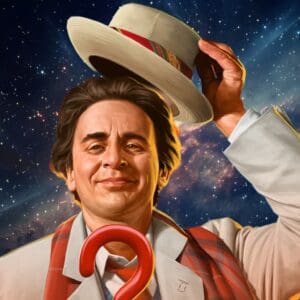
Main Range • Episode 46
Flip-Flop
Reviews and links from the Community
This review contains spoilers
Review of Flip-Flop by Speechless
The Monthly Adventures #046 - “Flip-Flop" by Jonathan Morris
It’s a little difficult to talk about something like Flip-Flop. We are now deep in Big Finish’s experimental phase, getting something different with every other release. We had Creatures of Beauty and its bizarre, non-linear structure. We had Doctor Who and the Pirates, which became a musical for one part. And now we have Flip-Flop, famous for its unique structure that allows you to listen to its discs in any order. Unfortunately, it's also rather infamous due to its inclusion of some rather… unfortunate aspects, that were, according to the author, completely accidental. Somehow I find it hard to believe.
The Doctor and Mel, searching for a crystal toxic to the Quark race, land on the only planet that mines it - Puxatornee. But upon arriving, they discover a harsh reality and some unknown acquaintances. It seems they’ve already been there.
(CONTAINS SPOILERS)
It’s a little tricky to talk about a story so problematic. On one hand, you could separate points, only half of this audio covers the offensive elements, so you could simply ignore it. On the other hand, a half-rotten apple is still a rotten apple, and this entire script does leave a bad taste in your mouth. First, what’s good? Well, the gimmick is easily the most interesting thing here. This story can be described as a narrative möbius strip, constantly looping no matter how many times you listen to it. The “white” half of the story ends and the “black” one begins. When you finish the “black” half, it begins the “white” half. So on, so forth, the members of the story forever stuck in an ever-looping world due to two characters forcing the Doctor to change history in each version of events. It’s a really neat little sci-fi concept that is executed incredibly well, the format aiding the idea wonderfully. What also helps is how well everything’s constructed. Everything is made to make sense, no matter what order you listen to it in (I listened to the second half, “black” first, by the way, for the sake of the gimmick). And what’s really fun is seeing the blanks get filled, being shown more insight into the breadcrumbs left behind. It would be really easy for this story to trip over itself and end up filled with plot holes but Morris manages to keep the whole thing structured and interesting. The plot almost feels Nolanesque; in fact, this might be the plot of Tenet, but I can’t really remember, that whole movie was a bit of a blur. As of our cast, pretty much great across the board. This is a very Seventh Doctor story and McCoy is predictably great, as is Mel who is characterised incredibly well by Morris. As for the rest of the cast, they all pretty much deliver. All characters feel very real and complex, each one’s motivations thought-out and rational. They’re not outstanding but it’s always nice to be invested in a sidecast.
However, we then have to talk about the other thing Flip-Flop is known for. I’m going to have to be objective here and rate Flip-Flop down quite a bit more than my gut would tell me, despite enjoying it more than some stories I’ve rated higher, because it’s undeniably flawed, even past it’s one major fault. Jonathan Morris has reported this element to be accidental, which I can’t really understand because Flip-Flop has the unique property of being incredibly racist. Basically, our main villains are Slithergees, slug like beings who posed as refugees to gain access to Puxatornee, insidiously taking over by accusing the humans of racism whenever they don’t get their way, slowly becoming the majority and erasing human culture. This is sickeningly very similar to a real-world racist argument, typically used by anti-semites that really has no place in Doctor Who. But, allegedly, it was not made with any ill-will in mind. Apparently, Jonathan Morris is actually quite left-wing, despite this having all the subtlety of a Daily Mail article, so who knows. I actually think it could be possible this whole mess was an accident because the real world argument Flip-Flop has parallels to is ridiculous and baseless enough to be science-fiction. However, the Slithergees being giant slugs with the faces of Jewish caricatures? That seems a little too on the nose (though apparently, Jonathan Morris just imagined them as giant slugs and it was the cover artist, Lee Binding, who made the model used). This whole debacle feels similar to two other stories: The Ark and Kill the Moon. The Ark because it’s a really neat sci-fi idea squandered by a weird, right-wing ideology of “the oppressed really being the bad guys!” and Kill the Moon because despite being a ridiculously on the nose right-wing allegory, it was apparently not meant to be a ridiculously on the nose right-wing allegory. At the end of the day, it is unfortunate and whether it was intentional or not doesn’t make the issue itself any better. Luckily it’s only the focus for about half the story but it does make this one quite hard to sit through. On a more conventional note, Flip-Flop still struggles elsewhere. I think its biggest problem besides the obvious is that it relies too much on its concept, which is something experimental Big Finish can stumble into sometimes. Because it’s so preoccupied making the story fit together and setting up clues for the next half of the plot, it forgets to actually write an engaging episode of Doctor Who and it ends up as busy work for a good part of the runtime. Plus, because the two halves are variations upon the same story, it can get quite boring to see the same characters make the same mistakes you just saw, with the only new thing being you going “oh, that’s different now” every once in a while. Also, due to the format, the story doesn’t really have an ending, just two different bits of set-up. And finally, the worldbuilding falls flat. Again, the adherence to the formula means we don’t get much of a story outside of it and, because of that, what should be the richly thematic and interesting world of Puxatornee becomes a series of faceless streets and rooms.
Flip-Flop in one word would be “unfortunate”. It’s unfortunate that Jonathan Morris wrote something like this and in fact, I’d call it confusing especially since Morris has now become a regular writer for Big Finish and has even written We Are the Daleks, which is apparently a critique of Thatcher-era Britain. Flip-Flop it’s a strange little oddity that has some really great ideas behind it, but is smothered by its own misguidance. A real shame, I’d say.
5/10
Pros:
+ Really interesting time travel concept that the story takes full hold of
+ Well constructed and complex story
+ Good cast of characters
Cons:
- Steeped in utterly awful politics, however accidental
- Due to the focus on the gimmick, the story never really moves past it
- Yet another wholly unexplored world
This review contains spoilers
Review of Flip-Flop by kiraoho
21.09.2022
This is the future liberals want. The Slithergees' world is essentially a very American-right view of immigration and refugees. If the story didn't give me much else, this alone would've been enough for 0.5/5.
Fortunately, the world is not a focus of this story. Instead it features a very interesting story structure, not unlike Nolan's storytelling shenanigans.
The story itself is not that good. Several times you find a scene to be quite forced, as though lacking a draft or two, feeling like this is not where the story would've gone, but instead where the writers needed it to go. Nevertheless, I have to commend it for the balls it took to do such an experiment. 2/5
Review of Flip-Flop by mistwhisper117
It's a fascinating concept and execution for a story. It might have worked better visually, but it all came together in the end and made sense. Hard to say much of anything else without spoilers. The Slithergees were infuriating though. Eventually, you have to put your foot down sometime.
This review contains spoilers
Review of Flip-Flop by slytherindoctor
MR 046: Flip-Flop
Wow. You know it didn't have to be like this. This could have been fixed so easily with a couple more rewrites. This one is bad not because of badly written dialogue or being boring. It's not because of bad audio mixing or any technical issues. It's not because it's buried in technobabble or does hilariously bad accents that make your skin crawl. This one is bad because of its politics. Ironically the second with bad politics after The Fearmonger, another Seventh Doctor story.
But first, the story. The Doctor and Mel are involved in a double time loop. Two versions of history keep switching back and forth as people from those timelines want to go back in time and change it so their version doesn't happen. Like a grass is always greener situation. Yet each time they regret the change.
The basic premise here could have been a good one. You're supposed to be able to listen to either disc first and the story will make sense from either side. The first story of each disc is simultaneously the beginning of the story and the end of the story from the other disc while the second story of each disc is the end of the story and the beginning of the story from the other disc. It could work really well, especially if it didn't essentially repeat the exact same dialogue but with minor variations in each timeline.
The divergent point is when the human colony of Puxatornee (named for the groundhog in groundhog day, get it? get it?) gets visited by a battle cruiser filled with a species call the Slithergees, giant blind slugs. They are refugees who demand to be allowed to live on Puxatornee's moon or there will be war. One version has a war that leaves devestating radiation with the Puxatornee humans on the verge of extinction. The other version has the Slithergees essentially invading and conquering Puxatornee. This is where the problem comes.
Each version of history has a Stuart and Reed, commanders in the war history and dissidants in the conquered history who try to go back in time to change their history and end up creating the other time line. Thus it is a double time loop. Each time the loop goes round the history changes back to the other side. Like I said, this could be an interesting premise and could work better in the hands of a better writer.
The bad politics comes from the conquered Puxatornee side. The writer really thought he had something here. He thought he was going to create a liberal and a conservative side and have them both be dystopias. He wanted to satirise liberal politics. Just like every other conservative who thinks they're creating satire, they can only ever imagine liberals creating a fascist dystopia with the humans becoming slaves. It's as if we all inately understand that conservative politics are evil, even the conservatives who are trying to inact them.
All of the conservative "satire" comes from one episode in which we see the Slithergee have pretended to be victims in order to enact an actual invasion while the weak willed (naturally) woman liberal complies to all of their demands in an effort not to look offensive. It's a pretty dangerous line of thinking.
There's the typical rhetoric you see from conservatives. White people (I mean humans) are being made into a minority in their own colony (white genocide anyone?). It makes a point of saying that Slithergee occupy 90% of the planet while humans are forced into ghettos. Humans are forced into being servants/slaves to avoid looking offensive to the Slithergee.
There's even one to one War on Christmas rhetoric straight from Bill O'Reilly circa 2003. Quite literally. It's set at Christmas specifically so that the Slithergee can say that Christmas is offensive and should be replaced by their own holiday.
The War on Christmas stuff is obviously ridiculous, but it's part of a larger rhetoric to pretend like immigrants are forcing white people to become oppressed minorities. We live in the middle of the global ressurgance of fascism. We're all very familiar with this rhetoric by now. Conservatives don't really dog whistle anymore, they just show open contempt for minorities now. They believe that immigrants and refugees are invaders and the liberals are collaborators in white people becoming a minority and becoming oppressed.
If you really believe that refugees or immigrants are an invasion there are only two solutions to this problem. And it's not going back in time to prevent refugees from coming into your country in the first place. You either round up people from their homes and mass arrest everyone of that minority so that you can deport them. Or you do the same thing and kill them instead. The Nazis themselves did both. They tried to deport the Jews, but no other country would accept them as refugees, because of their own xenophobia. So the Nazis ended up killing them instead.
This is why this audio is seen as taboo. With good reason. And it could have been such an easy fix. The Slithergee actually invade and enslave the humans instead of this ridiculous pretending to be victims conservative fever dream. Done. It would have been much more respected in the past twenty years instead of seen as despicable as it is now.
This is always the problem with conservative "comedy" as well. They aren't funny because they have no relation to reality. Immigrants don't pretend to be the victim in an effort to enslave the majority in the country they're in. Whenever you hear anything about racial tension, it's always the white people in the area getting upset that non-white people are there and making up rumors about them. This can be things like there being an increase in traffic accidents or something like they're killing and eating pets or even they're killing and eating children. In the conservative fever dream of reality, that's what they're really doing, as we see in this story, which is why their attempt at satire doesn't land. It's not real in any way.
I'm mostly surprised that this script was green lit in the first place. Doctor Who has always traditionally been more left wing so whenever you see scripts like this with conservative politics you have to wonder how they got made. I'm also rather surprised that Sylvester McCoy agreed to do this one too, considering his own personal politics. Ultimately, this would have been an interesting experiment, but the author ruins it with his bad political beliefs. It could have been good with a better author.
It's wild how we JUST had Jubilee, this fantastic dissection and look into the way fascist politics works at the human level. I was just talking about, in that review, how we have to guard against the encroaching reach of fascism, because it always pops up insidiously. And here it is, popping up.
This review contains spoilers
Review of Flip-Flop by mysticarcanum
I'm not happy to be giving Flip-Flop such a low rating, because frankly, episodes that get clever with non-linearity and time shenanigans are one of my chiefest delights in Doctor Who. While I can commend Flip-Flop for its clever construction and originality, I simply cannot say that this was an episode I enjoyed.
I shall get the most obvious issue out of the way first: the Slithergee. They seem like obvious bigoted caricatures, striking out at refugees and people with disabilities at once. One could certainly argue that they're meant to be a criticism of people who use their positions as minorities to excuse themselves of the blame for the harm they cause to others, but for that argument to hold, the episode would have had to delve deeper into the characters of individual Slithergee, which it does not. Plus, if you want to see that angle done well, look at Miriam in Jubilee. In comparison, the Slithergee struggle to come off as anything but a blatantly bigoted inclusion to this story.
The Slithergee are not alone in coming off as caricatures in this story. Every single character in Flip-Flop, aside from the Doctor and Mel, seem like cardboard cutouts of characters. President Bailey in particular strikes me as a totally motiveless character, and the dialogue in the scene where she sleeps with her secretary is almost comically unrealistic. The rest of the characters similarly seem to be easily categorized by one word personality traits – dumb, violent, greedy – that leads the entire plot to feel frustratingly farcical.
There are certainly some strong elements in this story; in particular, it's quite fun to realize how the pieces of the story fit together, and realize how earlier details given about the events of the day came to pass. I am, after all, enchanted by story structures like this.
However, the long and short of it is that stories need substance, not just structure, and what little substance there is to be found in this story is lackluster at best, and offensive at worst.
But hey, at least there was a Mind Peeler! When the Eighth Doctor mentioned it in Caerdroia, I thought it was a joke. Shows me, eh?
This review contains spoilers
Review of Flip-Flop by dema1020
I definitely think Flip-Flop is a little underrated but I do understand its limitations.
The design and clever use of time travel is a major highlight of the audio, to the extent I would consider this a pretty much must-listen for Doctor Who fans. The cool structure of the audio is really novel even among a long-running franchise with lots of crazy time travel, non-linear stories. It reminded me of the Big Bang in a good way, or a much, much better version of Ravagers. This is among one of the better ones, even if the story itself doesn't have much of a point, per se. It's a bit of a paradox that doesn't really get much of a satisfying resolution. This world the Doctor and Mel visit is essentially facing two versions of doom, and no matter what they do, they are basically screwed.
That feels mostly on the Slithergee, who essentially weaponize playing victim against the humans in such a way they are able to decimate the world of Puxatornee no matter what happens. All this and more I found really clever. Mel also gets to really shine here.
Where the audio is limited is more around some of the other characters. Mitchell and especially President Bailey felt way more off in their writing, with Bailey's whole affair feeling very silly both times around. Stewart and Reed were also more annoying than anything else.
I also agree with PalindromeRose, who, by the way, is one of my favourite Doctor Who reviewers, where the story could at the very least be interpreted as having some pretty heavy right-wing themes to it. This is something I definitely noticed, and it even has that particular flavour of modern conservatism that feels deeply rooted in a macabre sense of cynicism I kind of despise, but, I don't know. I didn't feel it was part of the authorial intent and didn't particularly get the sense that this was supposed to have politics meant to be taken that seriously. The Slithergee felt menacing more than a political statement.
So, overall, an imperfect but kind of legendary audio. The Christmas connection was threadbare, though, to the point I'm not really sure why they bothered.
This review contains spoilers
Review of Flip-Flop by PalindromeRose
Doctor Who – The Monthly Adventures
#046. Flip-Flop ~ 6/10
◆ An Introduction
During Doctor Who’s 40th anniversary year, BigFinish were putting out some utterly brilliant experimental audio adventures;
The Fifth Doctor and Nyssa got an adventure with a non-linear narrative, where all the characters experienced events in chronological order.
The Sixth Doctor and Evelyn got a musical adventure with pirates, inspired by Gilbert and Sullivan songs (which turned out to have a really deep and heart-wrenching plot woven into it).
But you very rarely hear people talk about the adventure that the Seventh Doctor and Mel got. A black and white disc forming a circular narrative, and a world which ends up being a pretty bleak place in both timelines. Which way will you listen to this adventure?
◆ Publisher’s Summary
Christmas Eve in the year 3060, and the planet Puxatornee is home to a prosperous human colony.
A space craft has arrived in orbit carrying the Slithergees, a race of obsequious alien slugs. Their home world has been destroyed and they are humbly requesting permission to settle on the first moon.
And if they don't get permission, then they are humbly threatening to declare all-out war.
The future hangs in the balance. The decision rests with Bailey, the colony' s president – but she has other things on her mind.
Christmas Eve in the year 3090, and the planet Puxatornee has changed beyond all recognition.
The Doctor and Mel arrive, on a completely unrelated mission to defeat a race of terrible monsters, and soon discover that something rather confusing has been happening to history.
◆ The Seventh Doctor
‘Flip-Flop’ is a story that is mired in controversy (more on that much later in the review) but one aspect where I can definitely praise it is the acting. Sylvester McCoy gets a script which really gets his character, and that is evident from the assured performance he gives… which is something we absolutely needed after the way he went on in that Eurovision parodying abomination!
The Doctor believes that it’s his duty to protect time, not fiddle about with it like some broken spin-dryer. All his life he has fought against people who believed that the ends justify the means.
◆ Mel Bush
‘Flip-Flop’ presents us with a great performance from Bonnie Langford, and it’s clear Jonny Morris really understands her character (shame this script is so notorious… wouldn’t be until 2015 when Morris would get to write for her again, in a script that is thankfully a lot less mired in bad political takes).
Mel isn’t inclined to use rude words, but if she was, she’d use several to describe how bumpy the TARDIS’ most recent landing was. She wonders why the prison cells seem to look exactly the same, wherever they go in the universe.
◆ Story Recap
The Doctor and Mel are busy fighting the Quarks on the Space Yacht Pinto when they decide to temporarily dip out of their adventure. The planet Puxatornee is the only place in the universe where they can get hold of leptonite crystals (which the Quarks are highly allergic to, exploding if they get within a mile of them). The planet was a brilliant place when the Doctor last visited in 3012, but a lot can change in seventy-eight years…
Depending on which disc you listen to first, you get a different view of Puxatornee – the “Black” timeline sees the world overtaken by a race known as the Slithergees, who came to the planet thirty years prior; armed to the teeth and demanding asylum. They’ve subjugated the human population and continue to take more and more land from them.
The “White” timeline is one where the human colonists eradicated the Slithergee warships before they even had a chance to land, but the war that occurred has left the planet scarred by radiation.
The Doctor and Mel may get off of Puxatornee with the crystals they desire, but there is one thing for certain – this world is doomed no matter which timeline you consider to be true!
◆ Möbius Strip
As I mentioned in the introduction to this review, ‘Flip-Flop’ was created during a time where BigFinish were really keen to experiment with their adventures. It’s definitely the least talked about story from that experimental era, and as for the reasons why that’s the case, we’ll get onto that can of worms in a bit… lord knows I’ve had to rewrite this review several times!
The whole gimmick of this story however is quite interesting; the decision to have a circular narrative where you can listen to the CDs in any order. For the purposes of this review, I started out with the Black CD. It means that the planet of Puxatornee is basically stuck on a Möbius Strip, as the different versions of Stuart and Reed continue to engineer different timelines. As I said, it’s definitely an interesting gimmick, but it comes with one major problem. The story doesn’t really have an ending, no matter which way you listen to it – there is no satisfying conclusion to events.
◆ Daily Mail Caricatures
‘Flip-Flop’ appears to be a lot more controversial than I first believed, after I discovered a few discussions on that cess-pool of the internet known as Reddit. I tend to stay away from forum sites like that, because us Doctor Who fans are known for being argumentative to the point of idiocy, and I don’t particularly want to stress myself out. That being said, the discussions I read on r/Gallifrey definitely gave me food for thought.
It appears that a lot of people take issue with the main villains of this adventure, the Slithergees, because they are seen as a far-right and racist depiction of immigrants. It had never occurred to me until I read the post by u/revilocaasi, but the writing for this story does feel like it’s leaning into all the Daily Mail cliches. You could argue that this is a twenty year old story and that times have changed, but that doesn’t stop it leaving a bit of a bitter taste in your mouth. It’s an issue that everyone is going to have a different stance on, and I’ve noticed very few other people have even brought it up (probably because it’s going to ruffle a lot of feathers, no matter your stance).
I really do think the Slithergees were a mistake because they are blatant caricatures written from a clear right-wing point of view. Some people will be able to look past it, but I absolutely cannot blame you if it’s something that particularly gets your goat.
◆ Sound Design
David Darlington really didn’t do all that much with the soundscape for Puxatornee. There is very little to distinguish it from any other frozen desolation, unfortunately.
Alarms signal to Slithergee patrols that the dissidents are roaming free on Puxatornee. President Bailey makes her Christmas address, whilst horrid festive music plays on a tinny speaker. The Mind Peeler is this horrible whirring torture device. Ringing alarms blare throughout the Presidential residence, as the Doctor sets the security alert in motion.
◆ Music
The music for ‘Flip-Flop’ is also being handled by David Darlington, who provides us with an electronic score that wouldn’t feel out of place in Season 24 itself. It’s quite good.
◆ Conclusion
“Any humans found on the street will be prosecuted, fatally!”
I’ve rewritten this concluding paragraph several times now because this whole review has been really difficult. It’s undeniable that the experimental format is interesting, despite the fact it basically means the story is stuck in a circular narrative with no ending. Sylvester McCoy and Bonnie Langford put on some really great performances, and you could say that of the entire cast…
But then you get onto the topic of the main villain in ‘Flip-Flop’, and you just open a whole can of worms. Jonathan Morris has written so many amazing BigFinish adventures, but I wholeheartedly believe that this story should have been rewritten several times to just outright remove the Slithergees (and I’m shocked nobody at BigFinish pointed out the right-wing subtext that said villains carried with them).
‘Flip-Flop’ came out twenty years ago and a lot has changed since then, but does that excuse a species that is so clearly a symbol of right-wing views? I think it’s down to the discretion of the listener. I personally don’t think Morris is part of the right-wing mob, because if he was I doubt BigFinish would have continued working with him (he’s one of their most prolific contributors). This story has just aged terribly from a political stance. I really didn’t expect it, but this has been my most difficult review to write to date.
Community Ratings
(Updates coming soon:)
Add the last X members who rated it here
Add number of Favs, and who they are, here






